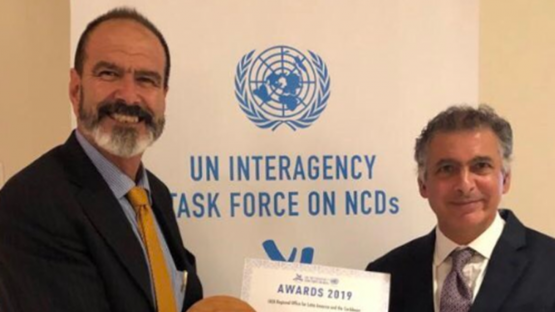IAEA’s Technical Cooperation Division for Latin America and the Caribbean receives UN award for its contribution to the prevention and control of non-communicable diseases
By Tyler Flenard From IAEA

The United Nations Interagency Task Force on the Prevention and Control of Non-Communicable Diseases (UNIATF) has recognized the contribution of the IAEA’s Division for Latin America and the Caribbean to the prevention and control of non-communicable diseases (NCDs). An award, presented to Luis Longoria Gandara, Director of the Division, highlighted the IAEA’s contribution to the fight against cancer, obesity and other NCDs in Latin America and the Caribbean.
Throughout 2018 and 2019, the IAEA’s technical cooperation (TC) programme in the region has supported over 20 health-related national and regional projects, in which almost 30 Member States are participating. “A major component of our technical cooperation programme focusses on addressing the provision of quality and safe services in diagnostic radiology, nuclear medicine and radiotherapy across the region,” said Longoria.
In 2018, a high-dose rate brachytherapy system was provided to the National Cancer Institute in Guatemala’s Dr Bernardo del Valle Hospital, through the TC programme. In order to ensure the safe and effective use of the equipment, the IAEA also delivered capacity building support to staff, placing a particular emphasis on the treatment of female patients with gynaecological tumours. As a result, Guatemala has increased its annual capacity to treat patients with cervical cancer by 50%, leading to a 60% reduction of the waiting list.
Similarly, the Institute of Cancer (INCAN) in Paraguay and the Hospital General San Felipe in Honduras have significantly increased brachytherapy treatments in the last two years, based on new high-dose rate brachytherapy systems and training provided by the IAEA.
“The Regional Cooperation Agreement for the Promotion of Nuclear Science and Technology in Latin America and the Caribbean, known as ARCAL, has identified and prioritized six areas for intervention in human health and nutrition, which now informs our joint efforts to fight cancer and other NCDs,” said Longoria.
Capacity building efforts, implemented through the regional TC programme, have resulted in the graduation and certification of 20 new radiation oncologists from 14 Latin American and Caribbean countries through theIAEA’s first-ever Master’s in Advanced Radiotherapy, which was developed in partnership with the Foundation Arturo Lopez Perez, the University of Andes and the Chilean Nuclear Energy Commission (CCHEN).
This year, seven regional training courses are being implemented in Latin America and the Caribbean to support more than 170 radiation oncologists, nuclear medicine physicians, medical physicists and nurses from 20 countries. These activities are targeted at developing multidisciplinary teams for the integrated management of cancers.
In nutrition, the TC programme has facilitated technology transfers in the use of stable isotopes for nutrition studies, strengthening the capacities of national laboratories in the region to develop and establish body composition reference curves for 6 to 24-month-old infants in 15 countries. These capacities are also being applied to improve the identification of sarcopenia—a degenerative loss of skeletal muscle mass, most commonly associated with the ageing process—in older people of the region.
In addition to recognition by the UNIATF, the contribution of the IAEA technical cooperation programme to the Caribbean Community’s fight against NCDs was highlighted at the recent 10th UN-CARICOM General Meeting. General Resolution 347 at the 73rd UN General Assembly stated that “the meeting took note that the International Atomic Energy Agency was making key contributions to the health system development—i.e. commodity procurement and strengthening radiation medicine in general. Additionally, IAEA was a purveyor of new technologies to curb insect vector diseases.”
Click here for more information about the IAEA’s ongoing efforts to support Member States as they address non-communicable diseases.





